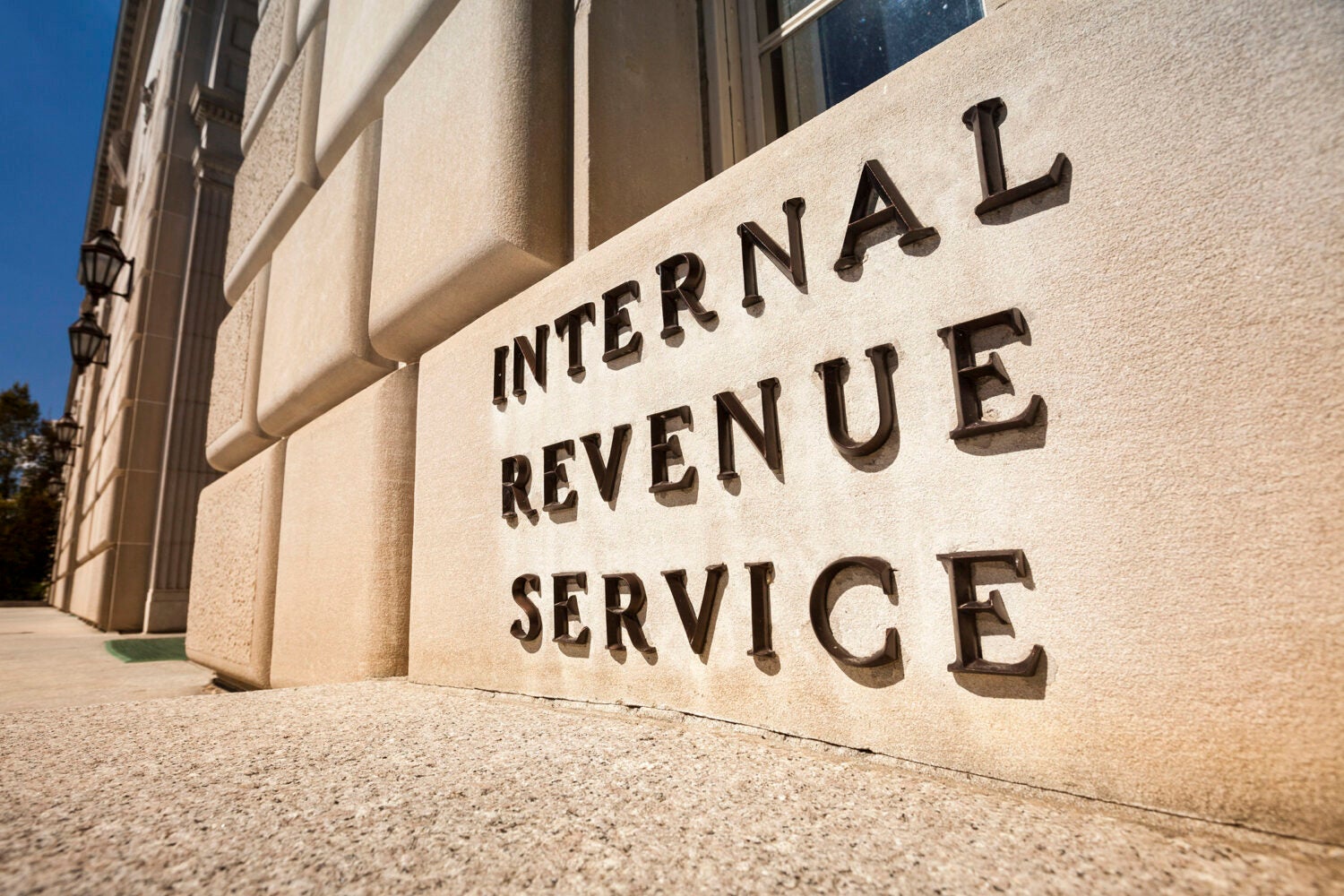As the April 15 federal income tax filing deadline begins to loom on the horizon for most Americans, Congress and the president are debating the future of the IRS. The 2022 Inflation Reduction Act allocated $80 billion in new funding for the IRS over 10 years. A new bipartisan budget deal negotiated in early January by Republican House Speaker Mike Johnson, Senate Democrats, and the Biden administration would rescind $20 billion of that. But that agreement hangs in the balance, as a group of House Republicans push for deeper spending cuts.
As the 2024 tax filing season kicks off, Harvard Law Today spoke to tax law expert Keith Fogg about why the IRS needs the money, whether it is possible to simplify the process of paying taxes, and how the agency everyone loves to hate is likely to perform this year. Fogg, a clinical professor of law emeritus at Harvard Law School, launched and then directed the Federal Tax Clinic, where students learn tax law while providing free services to low-income clients. Before teaching law, Fogg served for more than three decades in the IRS Office of Chief Counsel. Fogg says that, while recent improvements the IRS has already made bode well for this year, the agency is still facing challenges on multiple fronts.

Harvard Law Today: What should U.S. taxpayers expect this tax season? How well or poorly should they expect it to go?
Keith Fogg: I think this tax season should go pretty well. The IRS has improved its phone answering from a couple years ago. [According to a recent report by the Taxpayer Advocate Service, the percentage of taxpayers whose calls were answered increased from a mere 13% in 2022 to 85% last year.] And this year, there were not many changes in the tax law. Two things can really mess up the filing season. One is last minute changes to the tax code, which Congress has been doing in recent years. And second, is having enough people to answer the phone. I think the IRS has been doing a lot of hiring because of the additional funds they got. I’m not by any means saying it’s going to be perfect, but I think more phones will get answered and fewer tax returns will be problematic than they would be if there’d been a lot of last-minute tax law changes. So, my prediction would be that this filing season will go reasonably well.
HLT: You mentioned new funding for the IRS, the $80 billion over 10 years that was included in the 2022 Inflation Reduction Act. What challenges and opportunities did the Biden administration hope the money would help address?
Fogg: First, they were interested in hiring enforcement personnel to go after the higher income taxpayers and corporations. And that will take time, because it takes time to bring on somebody and train them to be effective as an agent. So that’s not going to happen immediately, but that will happen as they hire more people. The second thing they’re putting money into is the phone banks and making it so that you can get through to the IRS.
The third thing is upgrading their antiquated computer system. Do you remember when Obamacare was struggling at the very beginning because the computer system wasn’t working? President Obama called on Silicon Valley and brought in all these people to fix it. I wish they would do a similar thing for the IRS. They’ve been talking about fixing the computers for 25 or 30 years. But they can’t seem to get around to it and fix them. And I think this money will help fund the people and the equipment they need to improve their computer system.
HLT: Did I read that the IRS is piloting a new, online tax filing system?
Fogg: Yes, and you can give a lot of credit to former Harvard Law Professor Elizabeth Warren for this. She has been a big proponent of having the IRS offer free tax returns for people. Maybe 20 years ago, the IRS created a service called “free file” and different tax return software purveyors like TurboTax signed up. If you made under a certain amount of money, you could theoretically file your tax return for free. But there were a lot of problems with that because the companies that signed on for that were always trying to upsell you into paying for services, and very few people actually filed for free. So yes, they are trying but it’s been problematic. The IRS didn’t want to get into the tax return preparation business. But Congress is pushing them in that direction. And if this works, they’ll create a true free file so that lower income individuals can have their returns prepared at no cost. They’re running a small pilot of the system this year. And if that pilot goes well, then they’ll expand it, maybe for everyone next year. That is assuming the Congress doesn’t pass last minute changes before filing season.
HLT: Why is it such a problem if Congress passes last minute tax code changes?
Fogg: If Congress makes changes to the code in December, maybe software companies like TurboTax can pay their people double or triple overtime to work all through Christmas to fix the tax preparation software in time for the filing season. But the IRS will struggle to get its employees to make huge changes at the last minute.
HLT: Congress rarely manages to get the budget passed before December. As we speak in mid-January, we are on the precipice of a potential government shutdown. Knowing this happens each year, would it make sense to move filing day from April 15 to, say, June 15?
Fogg: I think it makes sense to move the filing date out. Not for the purpose of Congress, although that could be a collateral benefit. But I would like to see employers send your tax information to the IRS instead of you. Say you work for Harvard. Harvard generates a W-2 for you in January. You might have a side job doing retail at Walmart. You might have dividends. You might have interest income from savings. In those cases, you’re going to get a lot of little pieces of paper from a lot of different parties documenting all these taxable events. Instead of sending those to you, I would like those parties to send them to the IRS. The IRS would create a sheet that gives you all of your third-party information so that you don’t have to keep up with five or 10 pieces of paper. That would make it very easy for you to do the filing or to give to somebody else to do. The IRS already creates those sheets but not during the filing season because they don’t have time. But if they had time to do that, it would make filing a lot easier and it would improve compliance. That’s why I would push the filing season later.
HLT: What’s the downside?
Fogg: Many people want refunds in the winter, because that’s when the credit card bills for Christmas are coming due. And that’s when the heating bills are coming in. Wintertime can be the most expensive season for people. So, being able to get your refund in February matters to a lot of people.
HLT: What percentage of people get tax refunds from the IRS?
Fogg: A pretty high percentage, something like 70%. Those are mostly people who are employees and are having their taxes withheld. The people who have to pay typically are sole proprietors, or they have some source of income that’s not subject to withholding.
HLT: The most recent budget deal struck among the Republican House Speaker Mike Johnson and Biden administration and Senate Democrats would rescind $20 billion of the $80 billion in new IRS funding that was included in the Inflation Reduction Act. As of today, it isn’t clear that deal will hold because some House Republicans want more spending cuts. But how would rescinding 25% or more of the new funding impact the IRS’s ability to achieve the goals we discussed earlier?
Fogg: It would certainly have an impact. In 2010, Republican majorities in Congress began cutting IRS funding for 12 years in a row, and that really depleted the agency. So, a big part of this money was to try to make up for 12 years of underfunding. You can’t make up for 12 years of underfunding in one or two years. So, if they lose $20 billion of the $80 billion, they’ll do less than they otherwise would have. Whether that will be in enforcement for high income earners, phone responsiveness, or modern computer systems, I can’t predict. It’s been hard for the IRS and the Treasury Department to articulate that. And maybe that’s why it’s hard for them to defend the entire $80 billion.
HLT: Proponents of the cuts to IRS funding often frame them as money saving or deficit reducing. Is that correct?
Fogg: I don’t think so, because every dollar you invest in the IRS usually returns $5 to $8. Cutting the IRS funding is not a money-making proposition for the federal government. So, I think that’s a false narrative.
“Every dollar you invest in the IRS usually returns $5 to $8. Cutting the IRS funding is not a money-making proposition for the federal government.”
HLT: I want to come back to a point you made earlier about simplifying the way we pay taxes. There is a movement to abolish or dramatically shrink the IRS. In addition to the deficit-cutting argument, advocates say that the tax code is too complicated, that filling out the paperwork is too complicated and can be costly, and that the IRS ends up targeting various groups in disproportionate ways. Do they have a point? Is there a way to simplify the process of paying and collecting income taxes?
Fogg: Professor Joseph Bankman at Stanford is one of the leading proponents of having the government fill out your tax return using that same data that I was talking about before. If they collected all the data from third parties, they could fill out the tax returns of a decent percentage of the population; not the whole population, because a lot of self-employed people’s income and expenses are not showing up in the IRS database. So, we could make the process of filing income taxes simpler. But even the simplest tax system in the world in terms of how you pay wouldn’t eliminate the need for collection enforcement. You can’t do without some kind of tax agency because not all people voluntarily pay the taxes they owe. Most people do. But not everyone. We’d still need cops on the street enforcing compliance. And for that, the agency needs to be properly funded. Because if it isn’t properly funded, and they don’t have enough cops on the street, not everyone will pay. And when people think others aren’t paying their fair share, they won’t want to pay either. When you’re driving down Interstate 95 and the speed limit is 65 but everybody’s going 75, that becomes the norm, and you’ll start doing 75 too. IRS cops need to be out there just like the state trooper needs to be on the interstate if you want to enforce the law.
This interview has been edited for length and clarity.
Want to stay up to date with Harvard Law Today? Sign up for our weekly newsletter.
